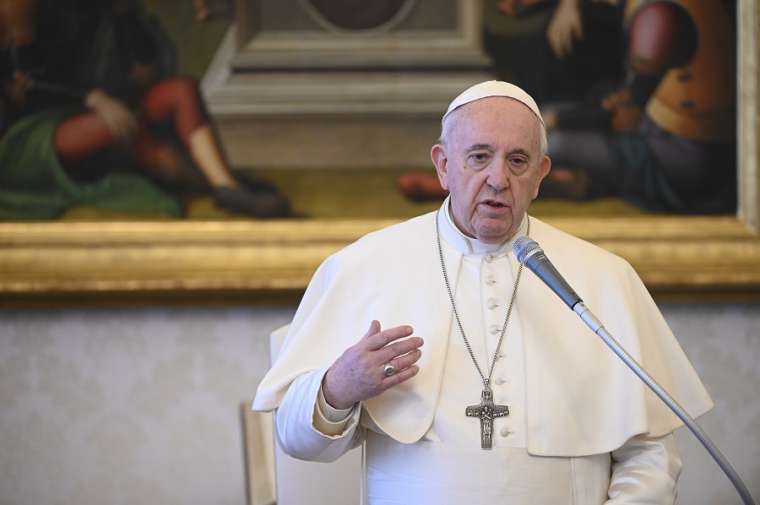Pope Francis gives his general audience address in the apostolic palace April 1, 2020. Credit: Vatican Media.
It is the Holy Spirit who leads us away from our sins and towards purity of heart, Pope Francis said at the general audience this morning.
Speaking via livestream due to the coronavirus crisis, the pope said that the purification of our hearts must begin by recognizing the evil that lies within us and renouncing it.
“This is a decisive maturity: when we realize that our worst enemy is often hidden in our heart,” he said. “The noblest battle is against the inner deceptions that generate our sins.”
In his address from the library of the apostolic palace, the pope continued his cycle of catechesis on the beatitudes, the eight blessings proclaimed by Jesus in the Sermon on the Mount.
Focusing on the sixth beatitude, “Blessed are the pure in heart, for they will see God” (Matthew 5:8), the pope said: “The pure of heart live in the presence of the Lord, preserving in the heart what is worthy of the relationship with Him; only in this way does it possess an intimate, ‘unified’ life, linear, not tortuous but simple.”
“The purified heart is thus the result of a process that implies liberation and renunciation. The pure of heart is not born such, he has experienced an inner simplification, learning to deny evil within itself, something which in the Bible is called ‘circumcision of the heart.'”
“This inner purification implies the recognition of that part of the heart which is under the influence of evil, in order to learn the art of always allowing oneself to be taught and led by the Holy Spirit. And so, through this path of the heart, we come to ‘see God.'”
When we “see God,” he explained, we recognise God’s presence in the Church’s sacraments and in our fellow human beings, especially the needy.
“In this beatific vision there is a future dimension, eschatological, as in all the beatitudes: it is the joy of the Kingdom of Heaven towards which we are going,” he said.
“But there is also the other dimension: to see God means to understand the plans of Providence in what happens to us, to recognise his presence in the Sacraments, in our brothers and sisters, especially the poor and suffering, and to recognize him where he manifests himself.”
He said the sixth beatitude was, in a sense, “the fruit” of the preceding five.
“If we have listened to the thirst for the good that dwells in us and are aware that we live in mercy, a journey of liberation begins which lasts a lifetime and leads us to heaven,” he said.
“It is a serious work and it is above all a work of God in us – in the trials and purifications of life – which leads to great joy, to true and profound peace.”
In off-the-cuff remarks at the end of his address, the pope urged Catholics not to be afraid to open their hearts to the Holy Spirit.
In his greetings to different language groups after his address, he invited the faithful to seek the intercession of St. John Paul II, who died on 2nd April 2005.
Addressing Polish Catholics, he said: “In these difficult days we are living, I encourage you to entrust yourselves to Divine Mercy and to the intercession of St. John Paul II, on the eve of the 15th anniversary of his death.”

